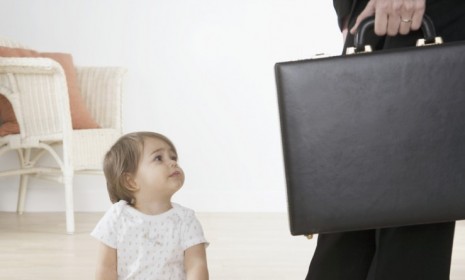'Welcome back to work' baby bonuses: Good for business?
A ground-breaking Australian company offers women who opt to return from maternity leave double pay for six weeks — claiming it's cheaper than replacing them

A free daily email with the biggest news stories of the day – and the best features from TheWeek.com
You are now subscribed
Your newsletter sign-up was successful
For many new moms, returning to a job after maternity leave can play havoc with their emotions. But now, an Australian company has introduced a policy designed to make the decision a little easier: "Welcome back to work" bonuses. Is it good business to lure new moms back to the workplace with financial incentives? Here, a brief guide:
How much do these new mothers get?
The company, Insurance Australia Group, gives new moms 14 weeks of paid maternity leave, on top of a government payment of up to 18 weeks at the country's minimum wage of $16 an hour. And now, IAG is paying returning new moms double their normal salary for their first six weeks back on the job, making it one of Australia's most mom-friendly companies.
The Week
Escape your echo chamber. Get the facts behind the news, plus analysis from multiple perspectives.

Sign up for The Week's Free Newsletters
From our morning news briefing to a weekly Good News Newsletter, get the best of The Week delivered directly to your inbox.
From our morning news briefing to a weekly Good News Newsletter, get the best of The Week delivered directly to your inbox.
How does that stack up to the U.S.?
The U.S. is one of only four countries that does not mandate paid maternity leave. Here, women get a maximum of 12 weeks unpaid leave under the Family Medical Leave Act, although companies can choose to offer their own paid leave (and the state of California does extend parental leave benefits, even to same-sex couples). The Australian policy is "a heartwarming (albeit mostly foreign) concept," says Meredith Carroll at Babble. It's great to see a company see "postpartum employees as assets instead of liabilities."
Why so generous?
More than half of the financial giant's 10,000 employees are women. Every year, up to 600 of them take maternity leave, and some don't come back. "We need to be above the minimum because we want to make sure we attract and retain the best quality talent we can," IAG's chief executive, Mike Wilkins, tells the Sydney Morning Herald. "Yes it's generous, but we're a business and it is about making sure we get quality people coming back to us."
A free daily email with the biggest news stories of the day – and the best features from TheWeek.com
Isn't that expensive?
Yes, but so is recruiting and training new staffers to replace women who drop out, Wilkins says. In the long run, the company expects the program to be "cost neutral."
Will other companies follow suit?
Ged Kearney, president of the Australian Council of Trade Unions, calls the move a "major advance" for women that could inspire other companies to sweeten their policies, too. But of course, not everyone is applauding. Several people have argued at the women's workplace blog The Grindstone that it's unfair to offer incentives to moms but not to childless women facing their own life milestones.
Sources: ABC.net, Adelaide Now, Babble, Huffington Post, Sydney Morning Herald
-
 The EU’s war on fast fashion
The EU’s war on fast fashionIn the Spotlight Bloc launches investigation into Shein over sale of weapons and ‘childlike’ sex dolls, alongside efforts to tax e-commerce giants and combat textile waste
-
 How to Get to Heaven from Belfast: a ‘highly entertaining ride’
How to Get to Heaven from Belfast: a ‘highly entertaining ride’The Week Recommends Mystery-comedy from the creator of Derry Girls should be ‘your new binge-watch’
-
 The 8 best TV shows of the 1960s
The 8 best TV shows of the 1960sThe standout shows of this decade take viewers from outer space to the Wild West